Elderberries have been recognized for their impressive health benefits, making them a popular subject in nutritional circles. High in vitamin C and dietary fiber, these small, dark berries pack a powerful nutritional punch. They have been traditionally used for a range of applications, from curing a common cold to boosting the immune system.
- Sambucus Immune Gummies are made with 90 mg of vitamin C, 30 mcg (1,200 IU) of vitamin D3 and 7.5 mg of zinc per 2-gummy serving to support immune health.* Also with highly concentrated, premium black elderberry extract.
- Elderberries have naturally-occurring anthocyanins, which provide antioxidant support.* Antioxidants help neutralize free radicals.*
Modern interest in elderberries is supported by scientific studies that acknowledge their nutrient profile, which includes carbohydrates, dietary fiber, and vitamins. With their increasing popularity, elderberries are now available in various forms including syrups, gummies, and capsules. This allows for easy integration into daily diets to potentially improve overall health.
However, with every natural remedy, it is essential to understand the safety considerations and possible side effects of elderberries. They must be properly cooked or processed before consumption to avoid potential toxicity. By evaluating scientific research and nutritional data, a comprehensive understanding of elderberry health properties emerges, equipping individuals with the information necessary to make informed choices about their health.
Key Takeaways
- Elderberries are rich in nutrients and have historical use as a natural remedy.
- Available in various forms, they offer flexibility for incorporating into health regimens.
- Safe consumption requires proper preparation due to the potential toxicity of raw berries.
Historical Use of Elderberry

Elderberry, or Sambucus nigra, is a plant that has been integral to folk medicine across various cultures. My awareness of its significance in traditional healthcare practices dates back to Europe, where it has been used for centuries. The berries and flowers of the elderberry tree are notable for their medicinal properties. In European folk medicine, they have been commonly utilized to treat infections and to boost immunity.
The use of elderberries is not only confined to Europe. Native American tribes also recognized the value of the elderberry plant, utilizing different parts of it for healing various ailments. The elements of the Sambucus tree were carefully utilized not just for physical well-being but also held spiritual significance.
In Europe, the berries and flowers were often made into syrups, tinctures, and infusions. These preparations were trusted to alleviate common cold and flu symptoms. The deep purple berries carry a wealth of immune-supporting properties, which echo through the annals of European wellness practices.
I’ve studied how the healing legacy of elderberry continues today. It’s common to still find elderberry products in homes and health food stores, underlining the deep-rooted trust in this Sambucus species. Although scientific studies have only begun to explore its full potential, the historical testimony of elderberry’s benefits is strong. It shows how traditional wisdom can complement modern health approaches.
Elderberry Nutritional Profile
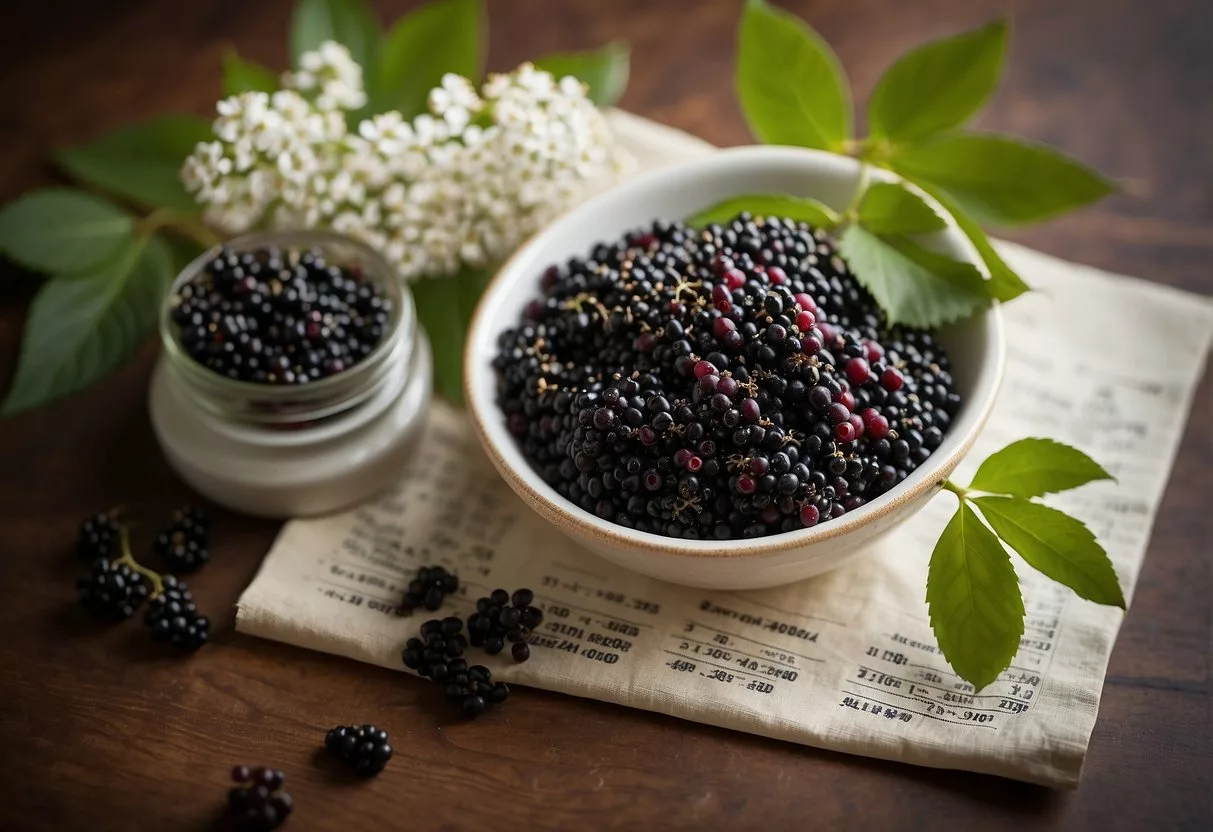
Elderberries boast a dense nutritional composition, making them not only a flavorful addition to the diet but also a beneficial one. I’ll explore the macronutrients, an array of essential vitamins and minerals, and the notably rich presence of bioactive compounds that contribute to their health properties.
Macronutrients in Elderberry
The Sambucus nigra, commonly known as elderberry, is a fruit that is relatively low in calories but provides a substantial amount of dietary fiber and carbohydrates. A notable fact about elderberries is their carbohydrate content, which includes natural sugars that give the berries their sweet taste. Despite their sugar content, they are also a good source of dietary fiber. Here’s a breakdown:
- Carbohydrates: 26.7 grams per cup
- Dietary Fiber: 10.2 grams per cup
- Protein: Less than 1 gram per cup
- Fat: Approximately 0.7 grams per cup
Elderberry Nutrition data indicates these berries are an energy-giving fruit with modest amounts of protein and fat.
Vitamins and Minerals in Elderberry
When it comes to vitamins and minerals, elderberries do not disappoint. Vitamin C, a potent antioxidant and essential nutrient, is abundant in elderberries, significantly contributing to the immune system’s functioning:
- Vitamin C: Roughly 52.2 milligrams per cup
In addition to their high vitamin C content, elderberries supply smaller amounts of Vitamin A and several B vitamins. The mineral content, although not as prominent, includes essential minerals like potassium, iron, and calcium. These vitamins and minerals collectively support various bodily functions including vision, skin health, and red blood cell formation.
Bioactive Compounds in Elderberry
Elderberries are especially rich in bioactive compounds which include flavonoids, anthocyanins, polyphenols, and phenolic acids, all of which are responsible for the elderberry’s deep purple hue. These compounds have garnered attention due to their antioxidant properties, which may help protect cells from damage:
- Flavonoids: Including quercetin and rutin
- Anthocyanins: Which have shown immunostimulant effects
- Polyphenols and Phenolic Acids: Contributing to the overall antioxidant capability of the fruit
Health Benefits of Bioactive Compounds in elderberries include supporting the immune system and potentially offering relief from cold and flu symptoms.
Health Benefits of Elderberry
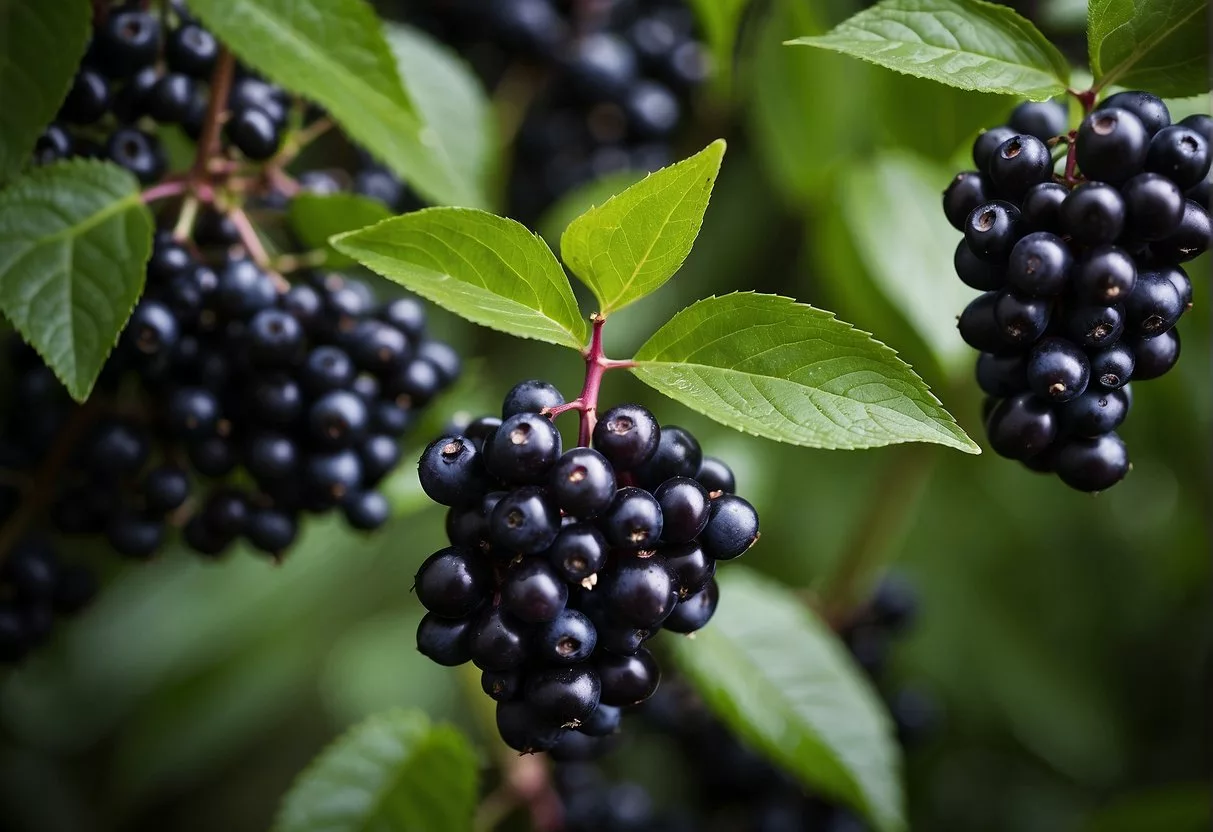
Elderberries have been studied for their various health benefits, specifically in boosting the immune system and potentially reducing symptoms of colds and flu. Rich in antioxidants, they may also contribute to heart health and offer digestive benefits.
Immune Support and Respiratory Health
Elderberries are well-regarded for their role in immune support. I understand that the compounds in elderberries, which include high levels of vitamin C and dietary fiber, are known to enhance the body’s immune response. They work by helping to lessen inflammation and oxidative stress, which are central to fighting off infections such as the common cold and influenza. Studies suggest that these berries may shorten the duration of flu symptoms and reduce the severity of respiratory infections.
Digestive Health
In terms of digestive health, elderberries contain substantial amounts of dietary fiber, which is beneficial for keeping the digestive system running smoothly. This fiber can act as a laxative, helping to alleviate constipation, and it can also aid in reducing nausea and vomiting. By contributing to a healthy digestive tract, elderberries may help prevent more serious digestive issues.
Cardiovascular Benefits
Elderberries may also have substantial cardiovascular benefits. They are thought to impact heart health by regulating cholesterol levels and improving blood vessel function, which in turn can help maintain healthy blood pressure levels. The bioactive compounds in elderberries can potentially protect the heart and reduce the risk of cardiovascular diseases.
Anticancer Potential
When talking about the anticancer potential, elderberries possess antioxidant properties that are significant to consider. While the exact mechanisms are still under scientific exploration, these antioxidants may help in preventing the development of cancer cells. It’s important to approach this potential health benefit with caution, as the research is not yet conclusive and should not replace conventional treatment methods.
Forms and Uses of Elderberry
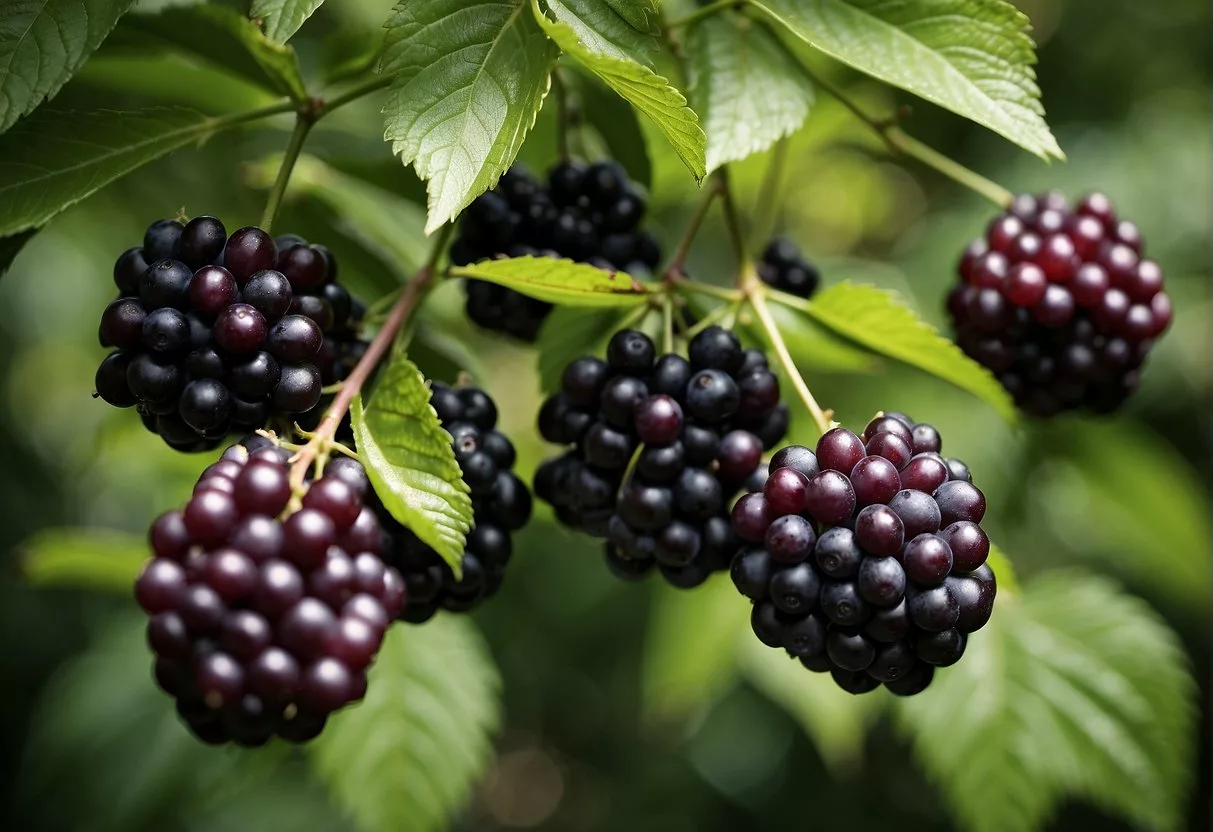
Elderberries are versatile and can be used in various forms, ranging from traditional remedies and culinary delights to commercial supplements. Each form harnesses the unique properties of elderberry to serve specific health and dietary needs.
Elderberry in Traditional Remedies
Syrups: I find that elderberry syrup is a staple in home remedies, especially for its potential to support the immune system during cold and flu seasons.
Teas: Elderberry tea, made from the dried berries or flowers, is commonly consumed for its soothing effects and is believed to alleviate respiratory symptoms.
Lozenges: These are well-suited for throat discomfort and use the extract of black elderberry to provide relief.
Culinary Applications of Elderberry
Jams: Elderberries have a distinct, tart flavor making them perfect for jams which can be enjoyed on bread or as a sweetener in porridge.
Pies and Wine: The berries can be cooked into pies or fermented into wine, offering a unique flavor profile loved by many gourmands.
Juice: Elderberry juice serves as a refreshing beverage and can also be incorporated into cocktails for a flavor twist.
Commercial Elderberry Supplements
Capsules and Gummies: When fresh elderberries aren’t available, I opt for commercial supplements like capsules and gummies, which provide a convenient daily dose of elderberry extract.
Extracts: Elderberry extracts are potent and are used in various supplements due to their concentration of beneficial compounds.
By understanding the diverse forms and uses of elderberry, we can better appreciate how this fruit supports health and enriches our diets.
Scientific Research on Elderberry

In my survey of existing literature, the scientific community has shown a growing interest in the potential health benefits of elderberry. Particularly, clinical studies and the investigation of elderberry’s bioactive components have been central to understanding its effects.
Clinical Studies on Elderberry Efficacy
I’ve found that randomized trials are critical for assessing the real-world efficacy of elderberry supplements. Notably, a systematic review highlighted by PubMed underscores that while no direct links to clinical inflammatory outcomes were found, some trials suggest elderberry may influence cytokine production, which is involved in the immune response to infections. Elderberry appears to have a role in the prevention or treatment of viral respiratory illnesses, though the results indicate that further research, particularly double-blind placebo-controlled studies, is necessary to confirm efficacy and optimal dosage.
Another aspect of interest is the correlation between elderberry intake and the severity and duration of symptoms. The findings in this area are promising but not yet conclusive, leading researchers to recommend further investigation.
Investigations into Elderberry’s Bioactive Components
My review also took me through studies examining elderberry’s rich inventory of compounds like flavonoids, antioxidants, and polyphenols. One investigation, available on PMC, reports low bioavailability of elderberry anthocyanins; however, these compounds’ presence in human blood and urine has been detected after consumption.
Furthermore, elderberry’s high antioxidant properties are well-documented. Compounds within elderberry, as stated in research hosted on ScienceDirect, are influenced by various factors such as variety and environmental conditions. This complexity hints at elderberry’s multifaceted role in promoting health, which is substantiated by its antibacterial and antiviral capabilities as well as potential to affect sugar and lipid concentrations in the body.
Elderberry Safety and Side Effects
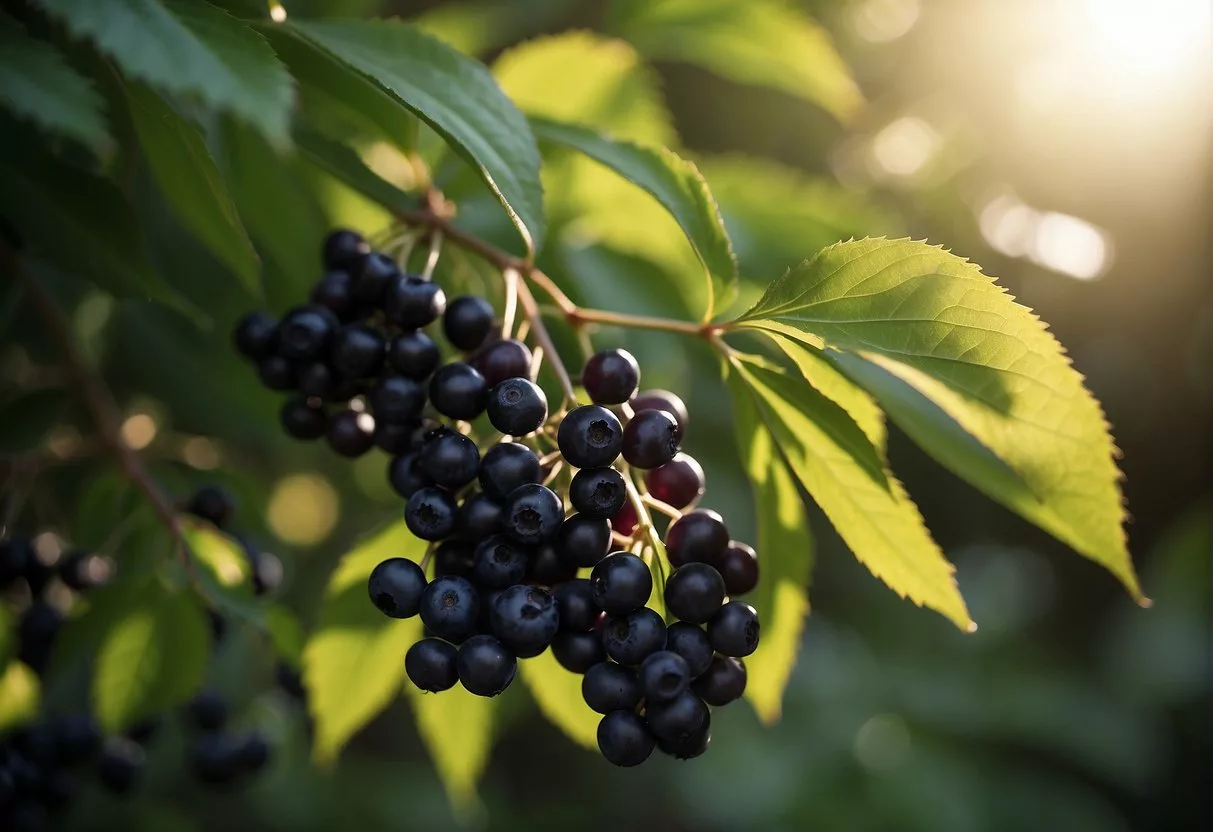
In my research on the safety profile of elderberries, I must emphasize that while they offer numerous health benefits, consideration of potential side effects and contraindications is crucial for safe consumption.
Potential Risks and Allergies
Elderberries are generally safe when consumed in food amounts; however, the raw berries, leaves, seeds, and stems of the plant contain compounds like cyanogen which can release cyanide. This substance can be poisonous and may lead to symptoms like nausea and vomiting. It’s important for me to note that properly cooked or processed elder products do not contain these compounds and are safe to consume.
When it comes to allergies, they are not commonly reported but can occur. Signs of an allergic reaction could include rash or difficulty breathing. I suggest that individuals with known fruit allergies consult with a healthcare provider before trying elderberries.
Considerations for Special Populations
I find that expecting mothers and those who are breastfeeding should exercise caution with elderberry. There is limited data on its safety profile for these groups, hence the recommendation to avoid use due to potential risks.
For individuals managing diabetes, elderberry’s effect on blood sugar levels could interfere with diabetic management. I reckon those with diabetes should monitor their blood sugar closely if they choose to incorporate elderberry into their regimen.
Lastly, while Hippocrates, the father of medicine, once touted the benefits of elder, my contemporary assessment remains that anyone with a chronic health condition or taking medications should consult with their healthcare providers to prevent possible interactions and side effects.
Nutritional Impact on Health Conditions
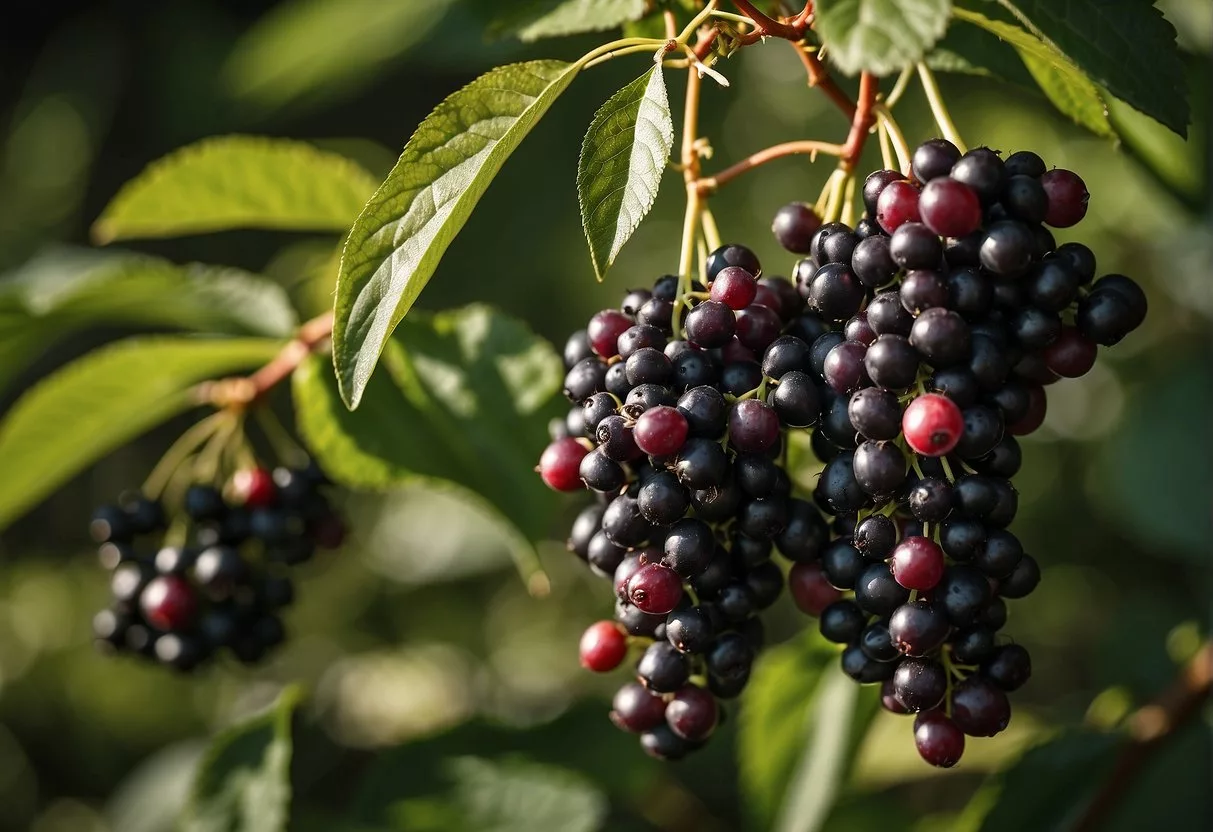
Elderberries have gained attention for their potential to influence various health conditions, particularly diabetes and mental well-being. I’ll explore how their nutritional components may impact these areas.
Elderberry’s Role in Managing Diabetes
Elderberries are observed to have beneficial effects on blood sugar control, which is crucial in managing diabetes. They are naturally high in dietary fiber, which can slow down the absorption of sugar in the bloodstream, potentially helping to moderate blood sugar levels. Additionally, they contain bioactive compounds that may enhance insulin secretion and improve insulin sensitivity.
Elderberry for Stress and Mental Well-being
When it comes to mental well-being, the antioxidants in elderberries can play a significant role in combating stress. Oxidative stress is a known contributor to mood disorders, and the high levels of vitamin C and flavonoids found in elderberries can contribute to the reduction of oxidative stress. By mitigating the damaging effects of oxidative stress, elderberries might support improved mental health and resilience to stress.
Comparative Analysis

In this section, I explore the specific qualities of elderberry, particularly the European and black elder varieties, in relation to other berries. I focus on their antioxidant profile and how they compare with other fruits typically included in mainstream health discussions.
Elderberry Versus Other Berries
When I compare European elderberry, particularly Sambucus nigra, with other berries, the standout feature is its high concentration of anthocyanins, which are potent antioxidants. My review of the research indicates that these antioxidants can contribute to the berry’s health benefits. Other commonly consumed berries, such as blueberries and raspberries, also possess antioxidants but in varying levels.
What sets elderberry apart is not just its antioxidant content but also the specific types of polyphenolic compounds it has. For instance, when I contrast the composition of elderberry with that of other fruits, I notice that elderberry’s unique blend includes flavonoids and anthocyanins that can support immune health. In comparison, other berries may have different balances of vitamin C and other health-supporting compounds.
Furthermore, the immune-supporting properties of elderberry are compelling and currently well-regarded in mainstream health contexts. While other fruits contribute to overall wellbeing with diverse vitamins and minerals, elderberry’s specific phytochemicals, like those found in black elder varieties, are related to antimicrobial activities.
As I review the evidence, it’s important to remember that each fruit and berry has its unique profile of health-promoting properties. Yet, elderberries stand out for their potent levels of antioxidants and the compelling research surrounding their potential health benefits.
Frequently Asked Questions
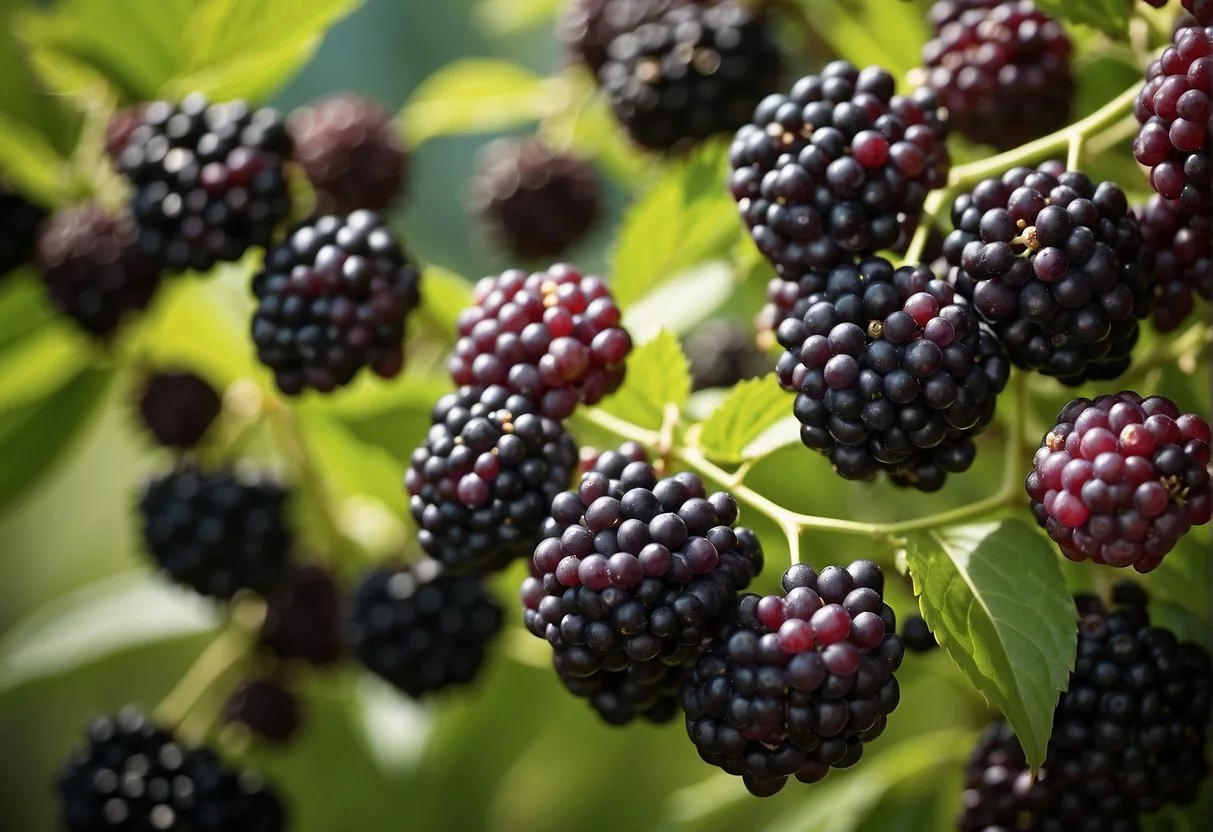
In this section, I’ll address common inquiries about elderberry, focusing on health benefits, daily consumption, immune support, considerations for specific medical conditions, skin health, and potential side effects.
What are the potential health benefits of consuming elderberry?
Elderberries are touted for their high antioxidant content, which may help support the immune system. They are also a source of various vitamins and minerals, which contribute to overall health.
Can elderberry be taken daily, and are there any risks involved?
While elderberries can be consumed daily in food-form, moderation is key. Supplemental forms should be taken as directed, since overconsumption may lead to risks such as gastrointestinal discomfort or immune system overactivity.
Are there particular benefits of elderberry for immune support?
Yes, research has suggested that elderberry may have immune-boosting properties, particularly in enhancing the body’s response to viral infections like the common cold or flu.
What should individuals with specific medical conditions know before taking elderberry supplements?
Individuals with autoimmune diseases or those taking medication that affects the immune system should consult a healthcare provider before using elderberry supplements, due to their stimulatory effects on the immune response.
How does elderberry contribute to skin health?
Thanks to its high vitamin C and antioxidant levels, elderberry may support skin health by aiding in the protection against oxidative stress and assisting in collagen formation, which is crucial for maintaining skin elasticity.
What are the known side effects associated with elderberry consumption?
Most people can consume elderberry without adverse effects, but some may experience mild side effects such as nausea or digestive disturbances. It’s important to only consume ripe, cooked berries or products made from them, as raw elderberries are toxic.